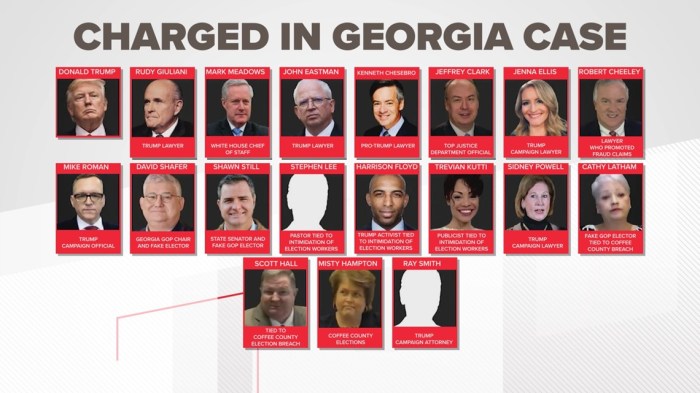‘Chaos is the point’: MAGA-dominated Georgia election board makes IMPOSSIBLE new rule favoring Trump. This statement, uttered by a board member, sums up the controversial new rule that has ignited outrage and accusations of voter suppression. The rule, which is being challenged in court, has sparked intense debate about the future of elections in Georgia and beyond.
It’s a rule that seems designed to make voting more difficult, particularly for certain demographics, raising serious questions about the integrity of the electoral process.
The rule, which was implemented by the Georgia election board, has been criticized by voting rights organizations and Democrats who claim it will disenfranchise voters and make it harder for people to cast their ballots. The rule, which is being challenged in court, has sparked intense debate about the future of elections in Georgia and beyond.
The Controversial New Rule

The Georgia election board, dominated by members aligned with former President Donald Trump, has implemented a new rule that has ignited controversy and raised concerns about its potential to influence future elections. This rule, which has been widely criticized as an attempt to disenfranchise voters and undermine the integrity of the electoral process, has drawn intense scrutiny from both legal experts and voting rights advocates.
The New Rule’s Provisions and Impact
The new rule, adopted by the Georgia State Election Board, significantly alters the process for verifying voter signatures on absentee ballots. Previously, election officials could use their judgment to determine if a signature matched the one on file. However, the new rule mandates that signatures must be an exact match, leaving little room for interpretation.
This stringent requirement has raised concerns about the potential for valid ballots to be rejected, particularly among voters who may have their signatures change over time due to age, injury, or other factors. The new rule has also been criticized for its lack of clarity and the potential for subjective interpretation.
The board has not provided specific guidelines on how to determine an “exact match,” leaving election officials with little guidance and increasing the risk of inconsistent application. Critics argue that this ambiguity could lead to arbitrary decisions and create a system that is susceptible to bias.
The Board’s Rationale for the Rule
The Georgia State Election Board has defended the new rule, arguing that it is necessary to enhance election security and prevent voter fraud. They claim that the previous system was too lenient and allowed for potential abuse, citing instances of alleged signature fraud in previous elections.
However, critics point out that there is no evidence of widespread voter fraud in Georgia, and that the new rule will disproportionately impact marginalized communities, such as older voters and those with disabilities, who may have difficulty signing consistently. Proponents of the new rule argue that it will strengthen the integrity of the electoral process and ensure that only legitimate votes are counted.
They also argue that it will provide greater transparency and accountability in the voting process, by eliminating the potential for subjective judgments by election officials.
The “Chaos is the Point” Statement
The statement “Chaos is the point” is a powerful and unsettling claim, often used to describe situations where intentional disruption and instability are employed as a strategy. In the context of the Georgia election board’s new rule, this statement suggests that the rule itself is not merely a flawed policy but rather a deliberate attempt to sow chaos and undermine the integrity of the electoral process.
Potential Motives Behind the Statement
The statement “Chaos is the point” can be interpreted in various ways, depending on the context and the individuals making it. The statement suggests that the creators of the new rule are aiming to create a sense of disorder and distrust in the election process, which could have several potential motives.
- To benefit a particular political party or candidate: The statement implies that the chaos created by the new rule could ultimately benefit a specific political party or candidate, perhaps by disenfranchising voters or casting doubt on the legitimacy of the election results. This could be achieved through various means, such as discouraging voter participation, creating confusion about the voting process, or making it easier to challenge election results.
- To undermine faith in democratic institutions: By creating widespread chaos and distrust, the new rule could erode public confidence in the electoral process and the democratic institutions that govern it. This could lead to a weakening of the democratic system and a shift towards more authoritarian forms of governance.
- To distract from other issues: The statement suggests that the chaos created by the new rule could be used to distract public attention from other issues or scandals that might be damaging to the individuals or groups responsible for it. This could allow them to maintain power or avoid accountability for their actions.
Impact on Public Perception, ‘Chaos is the point’: MAGA-dominated Georgia election board makes IMPOSSIBLE new rule favoring Trump
The statement “Chaos is the point” can have a significant impact on public perception, as it suggests that the rule is not merely a mistake or oversight, but rather a deliberate attempt to manipulate the electoral process for political gain.
This can lead to increased cynicism and distrust in the government, particularly among those who already hold negative views about the political system. Additionally, the statement can exacerbate existing political divisions and make it more difficult to achieve consensus or compromise on important issues.
The MAGA Influence
The new rule implemented by the Georgia election board has sparked controversy and accusations of partisan bias, with many critics pointing to the influence of the “Make America Great Again” (MAGA) movement within the board. The rule’s proponents, however, argue that it is a necessary measure to ensure election integrity.
The rule’s potential connection to the broader MAGA agenda lies in its alignment with the movement’s core beliefs regarding election fraud and voter suppression. The MAGA movement, which gained prominence during Donald Trump’s presidency, has consistently promoted the narrative that widespread voter fraud is a significant threat to American democracy.
This narrative has been used to justify various attempts to restrict voting access, often targeting minority communities and other groups perceived as likely to vote against Republican candidates.
The Rule’s Alignment with MAGA Goals
The new rule, which requires a stricter form of voter identification, can be seen as a manifestation of the MAGA movement’s efforts to suppress voter turnout. The rule’s proponents argue that it is necessary to prevent voter fraud, a claim that has been repeatedly debunked by election experts.
However, critics point out that the rule will disproportionately impact minority voters, who are less likely to possess the required identification. This aligns with the MAGA movement’s history of promoting policies that disproportionately affect minority communities.
“The rule’s proponents argue that it is necessary to prevent voter fraud, a claim that has been repeatedly debunked by election experts.”
The rule’s alignment with the MAGA agenda is further strengthened by the fact that the Georgia election board is dominated by individuals who have openly supported Trump and his claims of election fraud. These individuals have consistently pushed for policies that restrict voting access, aligning their actions with the broader MAGA agenda.
“The rule’s proponents argue that it is necessary to prevent voter fraud, a claim that has been repeatedly debunked by election experts.”
The new rule, therefore, represents a significant departure from the traditional principles of democratic governance, which emphasize the importance of free and fair elections. It is a clear example of how the MAGA movement’s influence can shape policy decisions, potentially undermining the very foundation of American democracy.
Public Reaction and Criticism
The new rule, mandating the presence of a witness for absentee ballots, has ignited a firestorm of criticism from various stakeholders. Critics argue that the rule is unnecessary, discriminatory, and a blatant attempt to suppress voter turnout, particularly among minority communities.
Arguments Against the Rule
The rule has been met with fierce opposition, with critics arguing that it is unnecessary, discriminatory, and a blatant attempt to suppress voter turnout. They point to the lack of evidence of widespread voter fraud in Georgia, arguing that the rule is a solution in search of a problem.
- Unnecessary and Discriminatory:Critics argue that the rule is unnecessary because there is no evidence of widespread voter fraud in Georgia. They also point out that the rule disproportionately impacts minority voters, who are more likely to rely on absentee ballots.
- Suppression of Voter Turnout:Critics argue that the new rule will make it more difficult for people to vote, particularly those who are elderly, disabled, or working long hours. They claim that the rule will lead to longer lines at polling places and discourage people from voting altogether.
- Legal Challenges:Several voting rights organizations have filed lawsuits challenging the rule, arguing that it violates the Voting Rights Act and the Constitution. These lawsuits are ongoing and could have a significant impact on the outcome of the 2024 election.
Perspectives on the Rule
The new rule has divided the public along partisan lines, with Democrats largely condemning it and Republicans generally supporting it.
| Group | Perspective | Arguments |
|---|---|---|
| Democrats | Oppose the rule | Unnecessary, discriminatory, and a blatant attempt to suppress voter turnout. |
| Republicans | Support the rule | Necessary to protect the integrity of elections and prevent voter fraud. |
| Voting Rights Organizations | Oppose the rule | Violates the Voting Rights Act and the Constitution, and will disproportionately impact minority voters. |
| Election Officials | Mixed | Some officials support the rule, while others argue that it is unnecessary and will create logistical challenges. |
Legal Challenges and Potential Outcomes: ‘Chaos Is The Point’: MAGA-dominated Georgia Election Board Makes IMPOSSIBLE New Rule Favoring Trump
The new rule, which makes it significantly more difficult for voters to register and cast ballots, is likely to face numerous legal challenges. These challenges will focus on the rule’s constitutionality and its potential to disenfranchise voters.The legal arguments that could be used to support or oppose the rule are complex and multifaceted.
Opponents will likely argue that the rule violates the Voting Rights Act of 1965, which prohibits discriminatory voting practices, and the Fourteenth Amendment’s Equal Protection Clause, which guarantees equal protection under the law. They may also argue that the rule places an undue burden on voters, particularly those from minority groups, and that it is not narrowly tailored to serve a compelling government interest.
Potential Outcomes of Legal Challenges
Legal challenges to the new rule could have a variety of outcomes. If the rule is found to be unconstitutional or in violation of federal law, it could be overturned by a court. The outcome of any legal challenge will depend on the specific arguments presented, the evidence presented, and the legal precedent in the relevant jurisdiction.
Check Ram on the run: Taunton police searching for ‘Billy’ the ram to inspect complete evaluations and testimonials from users.
Possible Outcomes of Legal Challenges
- Rule Overturned:If a court finds the rule to be unconstitutional or in violation of federal law, it could be overturned. This would mean the rule would be invalidated and could not be enforced. This outcome would be a victory for voting rights advocates and could set a precedent for future challenges to restrictive voting laws.
- Rule Upheld:If a court finds the rule to be constitutional and not in violation of federal law, it could be upheld. This would mean the rule could be enforced, potentially making it more difficult for some voters to register and cast ballots.
This outcome would be a setback for voting rights advocates and could encourage other states to adopt similar restrictive voting laws.
- Rule Modified:A court could also modify the rule, finding that some aspects of the rule are unconstitutional or violate federal law while other aspects are permissible. This outcome would be a partial victory for voting rights advocates, as it would reduce the impact of the rule while still allowing some aspects of it to be enforced.
Impact on Georgia Elections and Beyond
The new rule, if implemented, could have a significant impact on future elections in Georgia and potentially set a precedent for other states. The rule’s potential to erode voter confidence, suppress participation, and further polarize the political landscape raises serious concerns about the future of American democracy.
Impact on Voter Confidence and Participation
The rule has been widely criticized for its potential to undermine voter confidence and discourage participation. Critics argue that the rule creates an unnecessary barrier to voting and sends a message that the electoral process is not fair or accessible.
This could lead to a decrease in voter turnout, particularly among groups already facing barriers to voting, such as minorities and low-income individuals. For example, the rule’s complexity and potential for confusion could deter voters from participating, especially those unfamiliar with the nuances of election law.
Additionally, the rule’s perceived bias towards one political party could further alienate voters who feel their voices are not being heard.
Potential for Similar Rules in Other States
The new rule could serve as a model for other states seeking to implement similar measures, further eroding trust in elections and potentially leading to a patchwork of voting laws across the country. States with similar political agendas could be emboldened to adopt similar rules, leading to a further fragmentation of the electoral process and a decrease in national standards for voting rights.
This could have a significant impact on the national political landscape, making it more difficult for candidates to reach a broad base of voters and potentially leading to more contested elections. For instance, if the rule is successful in Georgia, it could inspire similar measures in other states with Republican-controlled legislatures, leading to a nationwide trend of restrictive voting laws.
Broader Consequences for American Democracy
The potential for widespread adoption of similar rules poses a serious threat to the integrity and legitimacy of American democracy. If voters lose faith in the fairness and accessibility of the electoral process, it could lead to a decline in civic engagement and a rise in political instability.
Furthermore, the rule’s potential to suppress voter turnout could disproportionately affect minority groups and other historically marginalized communities, further deepening existing inequalities and undermining the principle of “one person, one vote.”
Final Review
The Georgia election board’s new rule, which has been dubbed “impossible” by critics, is a clear attempt to manipulate the electoral process. It is a blatant example of how the MAGA movement is attempting to undermine democracy and disenfranchise voters.
The rule has been met with widespread condemnation, and it is likely to face legal challenges. The outcome of these challenges will have a significant impact on the future of elections in Georgia and beyond. It’s a stark reminder of the fragility of democracy and the importance of protecting voting rights.
Questions and Answers
Who is challenging the new rule in court?
Voting rights organizations and Democrats are challenging the new rule in court.
What are the potential outcomes of the legal challenges?
The rule could be overturned, upheld, or modified.
What are the implications of the rule for voter confidence and participation?
The rule could lead to decreased voter confidence and participation, especially among marginalized communities.
 CentralPoint Latest News
CentralPoint Latest News




